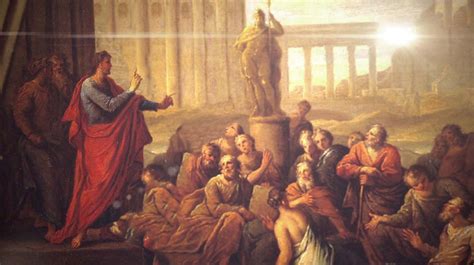As a young Baptist convert during my college years, I was challenged by my pastor to explain my continued interest in philosophy. I replied by citing the story about the Apostle Paul found in Acts 17: 16-34 where he claims to know the identity of the altar dedicated “to an unknown God.” “Ah, but that was the only city Paul visited that he did not establish a church!” — this reply was delivered with a look of smiling finality. His tone of authority stifled anything I might have said at the time, but I knew he was ignoring the historical reality of the early Church, its dialogue with the predominant culture and, more importantly, its adoption of Greek and Roman models of thought and expression, as seen in St. Augustine’s magisterial The City of God.
Entering the Catholic Church over a decade later, I expected to find a communion of believers who embraced the ongoing challenge of engaging the culture as seen not only in the Patristic Fathers of the early Church but throughout of its history, including the age of emerging secularism — Cardinal Newman and G.K. Chesterton — and modernity itself: Hans Urs von Balthasar.
What I found was disappointing. Yes, there was the inspiring leadership of Saint John Paul the Great and Pope Benedict XVI, who embodied the Pauline wisdom of addressing the “unknown God.” But very few echoes of that wisdom, a boldness in the face of culture, could be heard in Catholic life, whether in the parish or from its major institutions, especially Catholic colleges and universities.
Catholics no longer identified the “unknown God” for fear of offending the scoffers and unbelievers. It had become more important to earn the approval of those on the Areopagus than achieving what St. Paul had achieved: “We want to hear you again on this subject. At that, Paul left the Council. Some of the people became followers of Paul and believed” (Acts 17: 32-33).
The history of American Catholicism in the twentieth century, as a result, is the descent into a secularism brought on by acculturation. This is precisely the kind of virus that ran through Catholic colleges and universities after the Land O’Lakes Statement of 1967 — the crosses came down in the classrooms and the word Catholic was struck from catalogs in favor of this or that version of the “Catholic Heritage.” Why? Because, as the Statement read, “The university should endeavor to present a collegiate education that is truly geared to modern society.” In other words, Catholic institutions of higher learning should be shaped by the dominant culture rather than the sacred deposit of the Catholic faith and the cultural expressions that were themselves, over many centuries, shaped by the Church. Secularism was welcomed and vestige of Catholic culture was to be expunged.
What is needed is a book that examines the most important aspects of the relationship between the Church and culture. Its purpose will be to re-awaken and re-appropriate the Pauline wisdom and courage upon which the evangelistic efforts and the theology of the early Church was built. Such a book should begin with an account of culture itself, its necessity and influence, the history of Catholic acculturation before turning to the benefits of engaging critically with culture including the employment of what I have termed “cultural apologetics.”
Catholics who have avoided complete acculturation, but who are culturally literate, possess a vantage point from which to “discern the spirits”of the age, whether with appreciation or with castigation. In other words, evangelization becomes more effective when a Catholic can find a common point of contact, something agreed upon as true, good, or beautiful, and start a conversation from there. A cultural form of apologetics can be made explicit in a way that benefits traditional apologetics, by providing it a larger and more avid audience.
Anyone who listened in a detached way to the various admonitions to “Evangelize the culture” or “Take Back the Culture,” would conclude that Catholics view culture as a barbaric force to be defeated and converted. For Catholics, it’s easy to nod along and join conversations about sexuality on TV during what used to be called “the family hour,” the degenerate lyrics of popular music, or, even worse, the “dancing” that accompanies the music.
Culture in itself, of course, is not the enemy. Human persons necessarily live in a culture — actually an overlapping of various cultures — as an outward expression and embodiment of their values, principles, aspirations, desires, and world views. Culture belongs to the well-being of human nature, at least to the measure of happiness to be achieved in this life. Culture encompasses what Catholics call “solidarity,” the society and community of persons to which all belong. A culture is constituted by all that a person does, makes, thinks, feels, utters, sings, or even dreams. As a result, a culture becomes the repository and embodiment of values.
These values — which themselves may be true, false, or incomplete — then become part of the air we breathe. They are taken into our minds and hearts, usually unnoticed, because culture by definition is always pervasive, transmitting its embedded values and world views through the means of human communication and experience. Even those actions that may seem the most humdrum and trivial have deep cultural significance, what the Catholic writer Flannery O’Connor called — “the mystery of manners.”
Thus, the call to “evangelize” and “take back” the culture has a deeper meaning: the culture may appear to be the enemy but, more importantly, culture is the only means we have for persons to encounter the truth about their lives. If the Gospel is not given a voice in the culture then the Church hasn’t even begun the task of evangelization — the latest form of secularity, postmodernism, has the field to itself.
Those who view culture only as an influence to avoid are often blind to their own acculturation. There is no spiritual plane of existence, any form of piety, that transcends the bounds of culture. Those who deny the necessity of culture will also not recognize the opportunities it presents for evangelization or, and this is our final distinction, nourishment. Just as culture itself is not the enemy, just as it provides the vehicle of evangelization, a culture will inevitably contain much that is of value and importance to persons of faith. This openness towards culture is what “engaging” the culture means. Catholics do not engage merely to set things right, they engage the culture critically for enrichment. Recall the use made of Greek philosophy by the early Christians in the making of a theology using concepts which became the intellectual backbone of the Catholic tradition to this day.
This will be a book for Catholics and all persons of faith, to think critically about culture’s pervasive influence on all aspects of life and its institutions, including politics, spirituality, and religion. It will challenge the reader to recognize the necessity of engaging culture as the only means of evangelization and as a source of enrichment and knowledge. Until Catholics gain a better grasp of all these aspects of the Church and culture, confusion will continue to abound.













